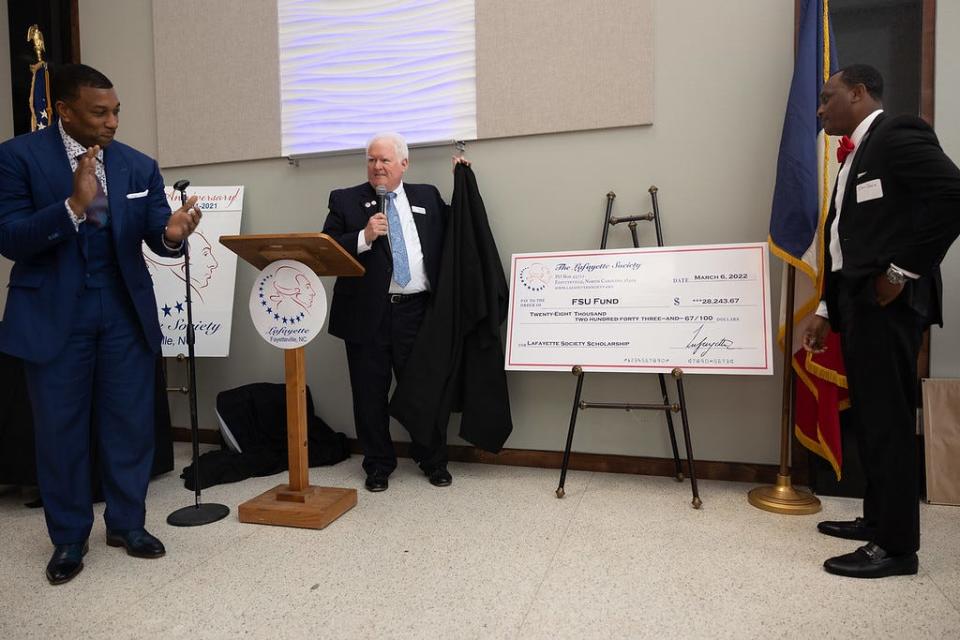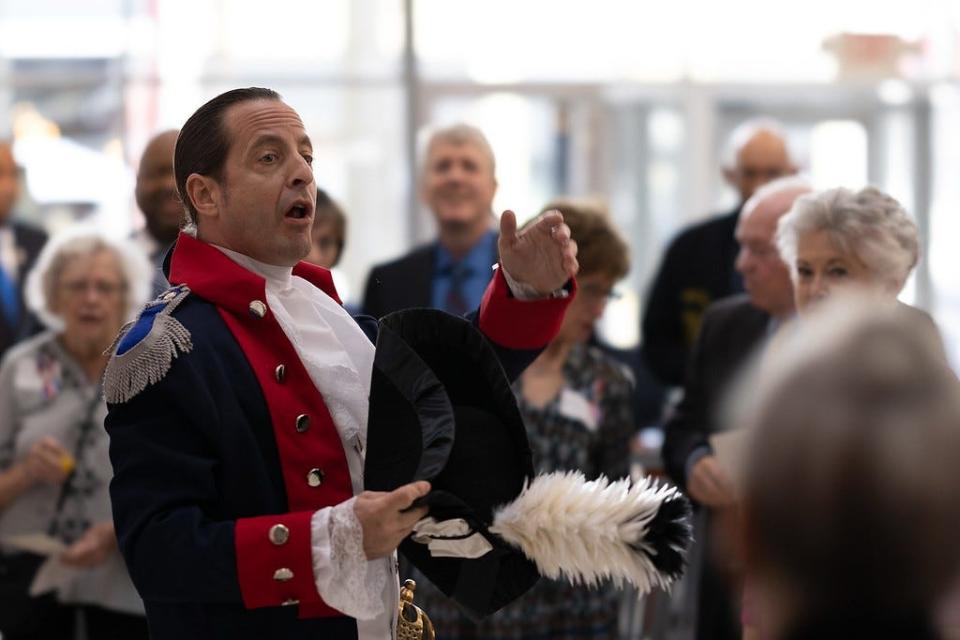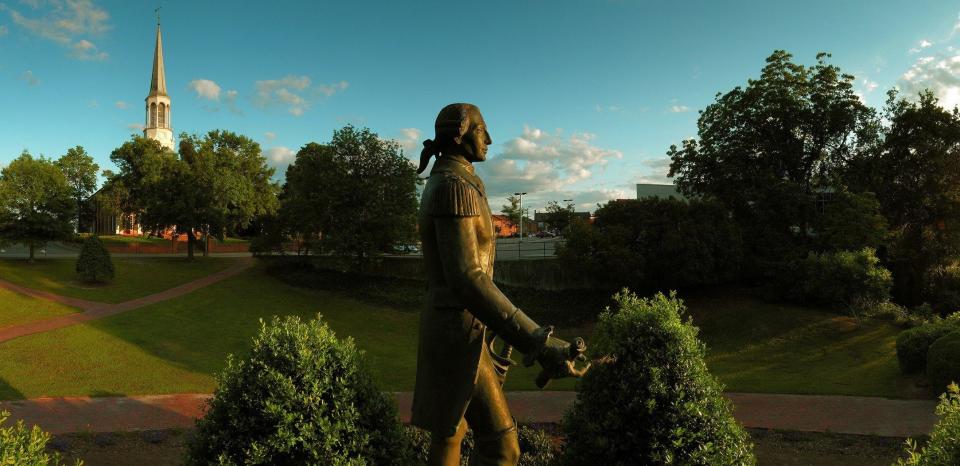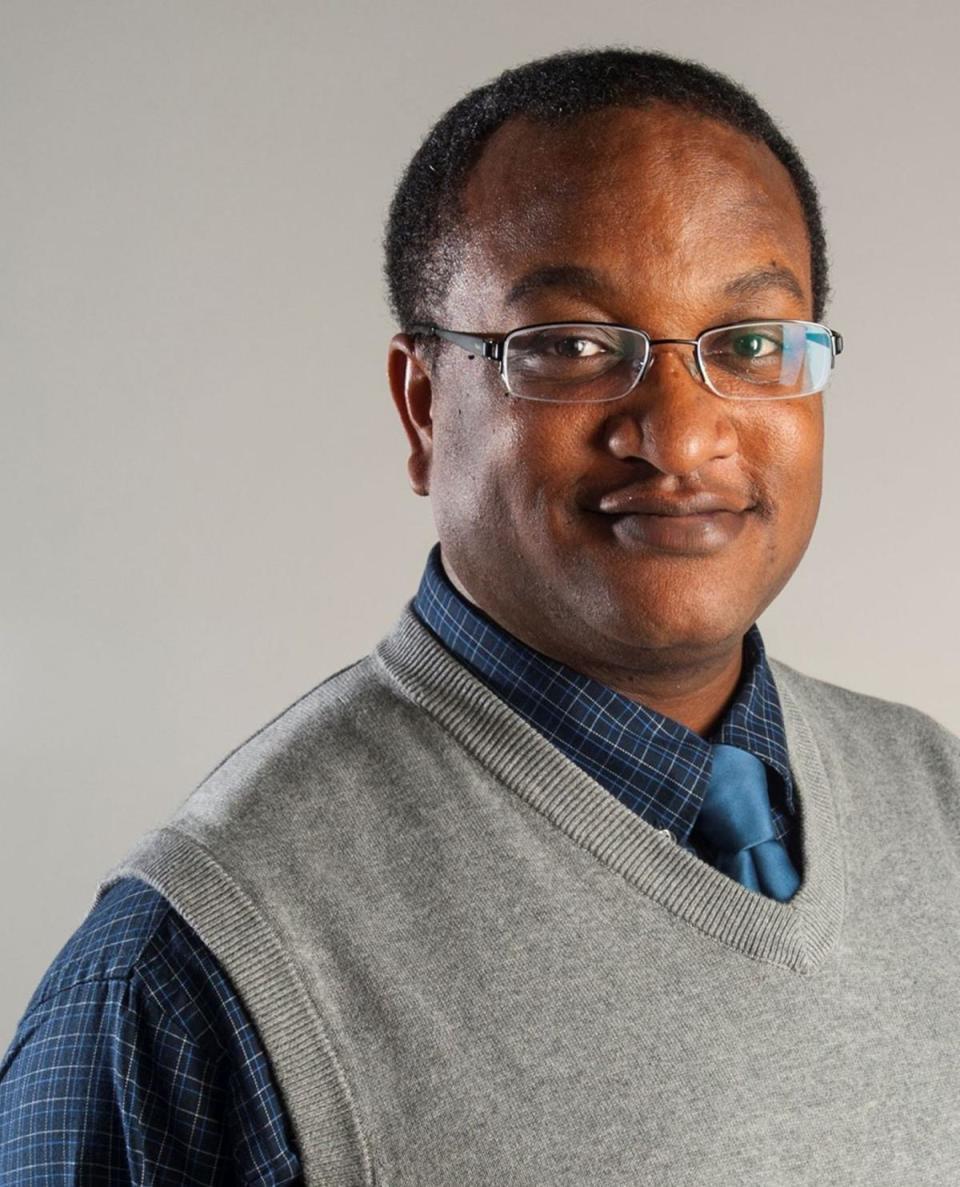Pitts: Black college students and older, mostly white historical group bond over Fayetteville’s namesake, history
On paper, these two groups may not look like obvious allies.
The majority of members of the Lafayette Society, a historical organization in Fayetteville, are white and in their 60s and above.
Members of the Black History Scholars Association, which is based at Fayetteville State University, are college students interested in history and enrolled at a historically Black institution.

But a partnership that stretches back to 2018 and has survived the pandemic has invigorated both groups, their members say. The relationship deepened last month at the society's annual luncheon and meeting when it accomplished a long-held goal of establishing a history endowment at FSU, the first of its kind at the university.
More: Pitts: E.E. Smith High students visit historic Fayetteville home of school’s namesake
More: Pitts: COVID-19 dings downtown Fayetteville development plans, nixing a hotel we needed

Rachel Ruff, an FSU senior and member of the Black History Scholars Association since 2020, was in attendance.
“They had a Lafayette impersonator there,” she says. “It was fun. There were some really good people who were there.”
Rob Taber, an FSU history professor and faculty advisor for the Scholars Association, said he has attended the society’s annual meetings in previous years, and the effect of the two groups’ relationship was clearly visible at the most recent meeting.

“It hasn’t just diversified in terms of race, but in terms of age,” he said, “I feel like my first couple of times it was like Sarah and I and one other couple under the age of 60 who was there. This most recent time there were a number of folk in their 20s, 30s, 40s and 50s, as well as much greater African-American participation.”
Hank Parfitt, immediate past president of the Lafayette Society and one of the historical figure Lafayette’s most vocal advocates, said the society has gained six Black members in recent years. He attributes that directly to the relationship between the society and the scholars association.

He shared an email he received shortly after the event from Elaine Porter, a charter member of the Lafayette Society, which was founded in 1981. Porter was instrumental in organizing and making accessible the group’s original Lafayette Collection.
“I enjoyed being part of the luncheon and seeing people whom I haven't seen in years,” Porter wrote. “It was a very meaningful experience to witness the newly established ties with Fayetteville State. I feel that the Society has reached a new level of relevance.”
The society has raised $45,000 to fund the endowment, which will continue a Lafayette speaker series and other programs. It will focus on the Age of Revolution, which encompasses the American, French and Haitian revolutions; emancipation; and civil rights.
At the annual meeting on March 6, Lafayette Society President Bud Lafferty presented a check of $28,000 to FSU Chancellor Darrell Allison. It represented the amount that had been raised for the endowment on the National Day of Giving last November.
A two-way street
The Marquis de Lafayette, namesake of the city of Fayetteville, was a friend and ally of George Washington and fought alongside him in the American Revolution. Less well-known is that he also opposed slavery and supported the gradual emancipation of Black people in bondage in early America and elsewhere.

That aspect of the Lafayette’s story has been one thread tying together the Lafayette Society and the Scholars Association, formerly called the Black History Club.
The association was established in 2017; its relationship with the Lafayette Society was formed soon after. In February 2018, the groups played host to Diane Windham Shaw, who was then director of special collections and archives at Lafayette College in Pennsylvania. She spoke at FSU about Lafayette’s anti-slavery positions and recounted the Frenchman’s role in causing Washington to free his enslaved workers after his death.
“Lafayette almost certainly helped influence his decision,” Windham said.
Ruff, who is from Durham, said she had learned a lot about the marquis since becoming involved with the Scholars Association and the Lafayette Society.
“And also it has to do with — I hate to say it, but ‘Hamilton’ is like my favorite play.”

She says her own research on Lafayette has led her to learn more.
“It’s really been inspiring,” she said.
Ruff is majoring in political science with a minor in creative and business writing. She is the director of diversity and inclusion for the student government; president of the Science Club, and a member of Alpha Kappa Alpha sorority. She says her parents, both FSU grads, spurred her interest in the History Association.
She said it had been rewarding interacting with the professional community through the Lafayette Society to include, “people who look different than us” and who are outside of her historically Black institution. She said it is easy for a person of any race to become comfortable in a space mainly inhabited by people of their own race.
“It is definitely a two-way street,” she said of the relationship between the society and association. “That is what we’re getting — different perspectives.”

‘Everything Fayetteville can be’
The idea for a partnership between the Lafayette Society and Black History Scholars Association grew out of a meeting between Parfitt, Taber and Gwen Melton.
“If you study Black history, you're going to learn American history,” Parfitt says. “If this is a pathway for a student at Fayetteville State to become passionate about history and maybe even become a history major, then I think we have really accomplished something.
“And by the way, history major is not a bad undergraduate major to have. In the difficult times that we’re in now, I think history really helps people understand how to negotiate the crosscurrents that we have in society right now.”

Over the years, the society and the association have held numerous joint activities, interrupted only by the COVID-19 pandemic. They have co-sponsored additional speakers, including Taber himself, who spoke about the Haitian revolution.
The society helped fund a historical trip for association members to Washington D.C. where the students visited the National Museum of African American History and Culture; the Dr. Martin Luther King Jr. Memorial; and Lafayette Park; and the society donated a lending library that stands at the entrance of the Charles W. Chesnutt Library on the campus at FSU.
Taber said he looked forward to more opportunities for students to play host to Lafayette-related events on campus, now that concern over the pandemic has lessened. He said it gives students an opportunity to connect with different people outside the campus community, noting that in attendance at the annual meeting were people such as Cumberland County Commissioner Glenn Adams and Fayetteville City Councilwoman Shakeyla Ingram, both of whom have FSU ties.
Taber praised the endowment.

He said: “It’s on a much smaller scale, but Henry Louis Gates Jr. set up something similar for African-American studies at Harvard, to make sure these conversations, this programming, these events wouldn’t be dependent on the whims of the university.”
As for the society: “It’s been really cool to see them embracing everything that Fayetteville can be,” Taber said. “It’s really neat.”
“We’re looking forward to continuing to build the partnership. Now that it’s fully endowed, we’re looking forward to a bright future.”
Opinion Editor Myron B. Pitts can be reached at mpitts@fayobserver.com or 910-486-3559.
Huge savings: $1 for 6 months
Subscribe today to support local journalism and enjoy unlimited digital access including videos, apps, sports news, and more. Special introductory offer for new subscribers only.
This article originally appeared on The Fayetteville Observer: Lafayette Society and FSU bond over Fayetteville’s namesake, history

 money
money 